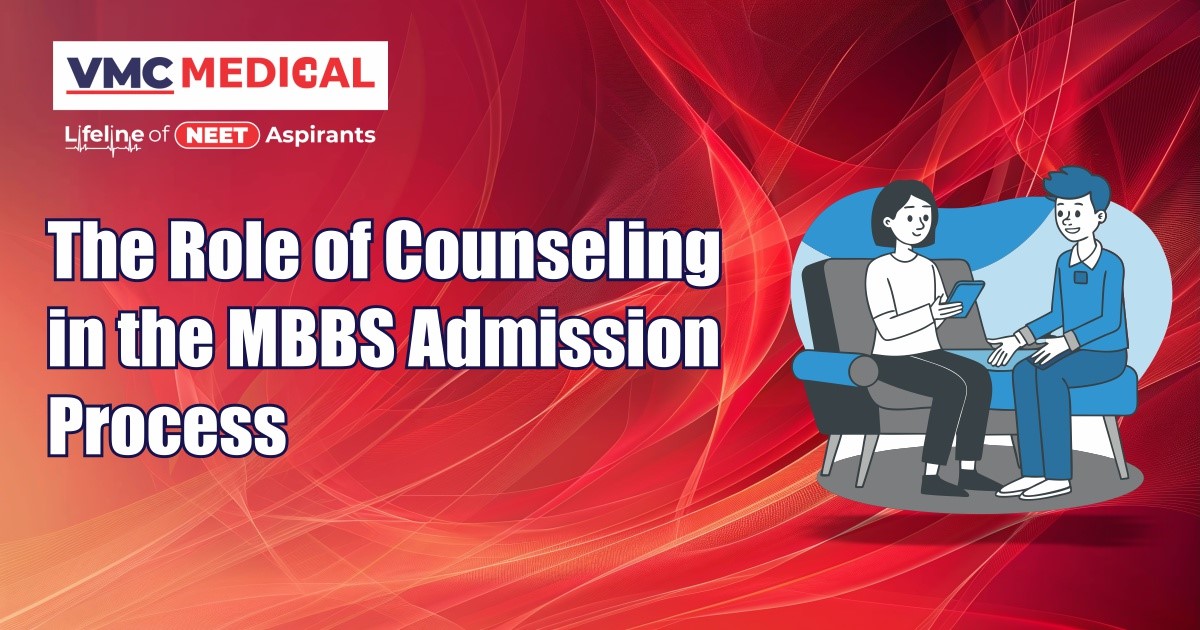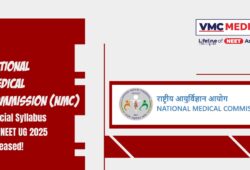The Role of Counseling in the MBBS Admission Process
 Posted On
Posted On
113 total views, 2 views today
Every year, thousands of students across India aspire to secure a seat in medical colleges for pursuing MBBS (Bachelor of Medicine, Bachelor of Surgery), one of the most sought-after courses in the country. However, the journey from preparing for the National Eligibility cum Entrance Test (NEET) to securing admission to an MBBS program is intricate, with the counseling process being a pivotal phase. This step not only serves as a bridge between a student’s NEET score and their dream institution but also ensures transparency, fairness, and accessibility in the admission process.
This blog dives deep into the counseling process, explaining its significance, the phases involved, and its role in shaping the future of aspiring doctors.
1. What is MBBS Counseling?
In the MBBS admission context, counseling refers to the organized process where eligible candidates are allocated seats in medical colleges based on their NEET scores, preferences, and available seats. Conducted by both central and state authorities, counseling ensures that medical seats are distributed fairly to candidates from different regions, categories, and quotas.
There are two main types of MBBS counseling:
- All India Quota (AIQ): Conducted by the Medical Counseling Committee (MCC) for 15% of the total medical seats across the country.
- State Quota Counseling: Organized by state authorities for the remaining 85% of seats in government and private medical colleges within a specific state.
2. Phases of MBBS Counseling
The MBBS counseling process involves several stages, each with its own set of rules and regulations. Here’s a breakdown of the primary phases:
a. Registration
The first step in the counseling process is registration. Candidates who have qualified NEET are required to register online with the relevant counseling authority, either for AIQ or state quota seats. During registration, candidates need to submit essential details such as NEET roll number, personal information, and their preference for courses and colleges.
b. Choice Filling and Locking
Once registered, candidates proceed to the choice filling phase, where they can list their preferred medical colleges and courses. Candidates are given a limited time to arrange these preferences, and once satisfied, they must “lock” their choices. This step is crucial because the subsequent seat allotment depends heavily on these choices.
It’s essential for students to be strategic and realistic while filling their preferences. Factors such as NEET rank, seat availability, college reputation, and location should be considered to maximize their chances of getting into a suitable medical college.
c. Seat Allotment
Based on the NEET score, candidate preferences, and seat availability, the counseling authorities conduct the seat allotment process. This is done through a computerized system to ensure transparency. After the process, students are informed about the college and course they have been allotted.
Seat allotments are usually conducted in multiple rounds. After each round, candidates can either accept the seat or participate in the subsequent rounds for better options.
d. Document Verification
After securing a seat, the candidate must undergo a document verification process. This is to ensure that the information provided by the student during registration is accurate and valid.
- NEET admit card and scorecard
- Class 10th and 12th mark sheets
- Birth certificate
- Identity proof (Aadhar card, passport, etc.)
- Category certificate (if applicable)
Only after the verification process is completed successfully can a candidate proceed with the admission process.
e. Reporting to the College
The final step in the counseling process is reporting to the allotted college within the stipulated time frame. At this stage, students must complete the admission formalities, pay the required fees, and start their journey in medical education.
3. The Importance of Counseling in MBBS Admissions
The counseling process is more than just a formal procedure; it plays a crucial role in ensuring fairness, transparency, and organization in the MBBS admission process. Below are some key reasons why counseling is essential:
a. Transparency
With thousands of students competing for a limited number of seats, transparency is paramount. The computerized and rule-based nature of the counseling process ensures that no student can manipulate the system to gain unfair advantage. Seat allotment is strictly based on merit, preference, and reservation policies, leaving little room for bias or favoritism.
b. Ensures Fair Distribution of Seats
India’s medical education system is designed to cater to students from diverse socio-economic backgrounds. Counseling authorities reserve a proportionate number of seats for various categories, such as Scheduled Castes (SC), Scheduled Tribes (ST), Other Backward Classes (OBC), and Economically Weaker Sections (EWS). They also have provisions for candidates with physical disabilities.
The structured counseling process ensures that these reservations are adhered to while maintaining overall merit-based admissions.
c. Facilitates the All India Quota and State Quota System
The division of seats into All India Quota (AIQ) and State Quota ensures equitable access to medical education for students across the country. Through the AIQ, students from any state can apply for seats in prestigious medical colleges located in other states, promoting national integration and diversity in medical education. The counseling system facilitates this complex mechanism effectively.
d. Guidance and Decision-Making
For many students and parents, the MBBS admission process can be overwhelming. With numerous colleges, categories, and quotas to consider, making the right decision is crucial. Counseling provides structured guidance, allowing students to make informed choices regarding their preferences. Furthermore, the multiple rounds of counseling give students the opportunity to reassess their decisions and seek better options if available.
e. Helps Avoid Errors and Irregularities
Without a centralized counseling system, the admission process could become chaotic, with the risk of errors and irregularities. By implementing a centralized, streamlined process, counseling authorities ensure that students are allocated seats based on objective criteria rather than subjective factors. This helps maintain the credibility and reliability of the medical admission process.
4. Challenges and Solutions in MBBS Counseling
While the counseling process is robust, it is not without its challenges. Some of the key issues faced by students and authorities include:
- Technical Glitches: Since the process is mostly online, technical issues such as server crashes or slow response times can frustrate students. Authorities must ensure that their systems are capable of handling large volumes of traffic, especially during critical times such as choice locking.
- Lack of Awareness: Many students, especially those from rural areas, may not be fully aware of the counseling procedures or may have limited access to the internet. More outreach and assistance programs should be implemented to educate students and provide them with the necessary resources to participate in the process.
- Overcrowding in Certain Colleges: Prestigious medical colleges are always in high demand, leading to intense competition for seats. Counseling authorities should encourage students to explore other reputable institutions as well, promoting a more balanced distribution of talent across the country.
Closing Thoughts
The MBBS counseling process plays a vital role in ensuring a fair, transparent, and merit-based distribution of seats in medical colleges. By providing structured guidance, facilitating a fair allocation of seats, and ensuring compliance with reservation policies, the counseling process helps students navigate the complexities of medical admissions.
For aspiring doctors, understanding and following the counseling process is critical to securing admission into a reputable medical institution and embarking on a successful medical career. With proper preparation and informed decision-making, students can make the most of this important phase and move closer to achieving their dream of becoming a doctor.



